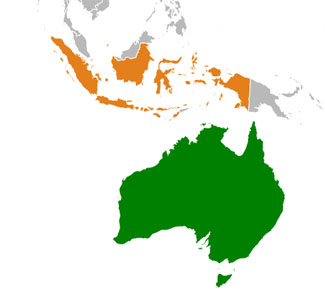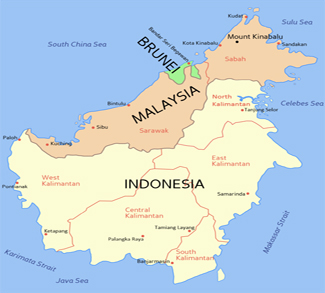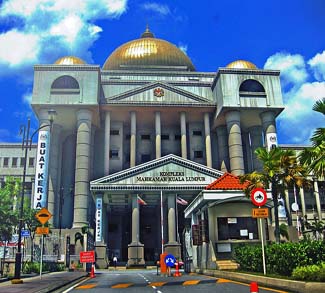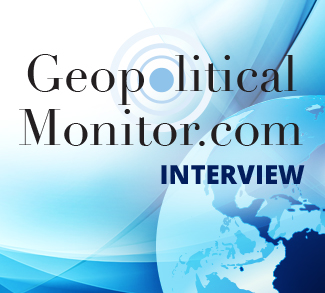The Australia-Indonesia relationship has always been a ‘testy’ one. Back in 1986, Indonesia, insulted by what it called slander by the Australian media, changed its immigration rules without notice when a group of Australian tourists were midway on a Garuda flight to Bali, forcing their return. It was only when former Australian Prime Minister Paul Keating placed great importance upon the Australian-Indonesian relationship in the 1990s that the relationship improved. However, this failed to evolve under the Howard government, which re-emphasized the Australian-US relationship. Since then, annual ministerial meetings between the two countries have focused on singular issues like people smuggling, asylum seekers, live cattle exports, and Australian prisoners in Bali, rather than important regional and geopolitical issues.
As a result, it could be argued that the Australia-Indonesia relationship has not grown into a mature one, being very little above transactional, with few deep and meaningful engagements between the leaders of both countries. This lack of personal rapport was partly to blame for the situation that almost led to major clashes between TNI and Australian troops in East Timor back in 1999.
The vastly different ways both countries view the relationship was apparent when President Susilo Bambang Yudhoyono’s and Prime Minister Kevin Rudd gave their respective addresses to a joint sitting of the Australian Parliament in 2010. Rudd spoke of the achievements of the relationship, while Yudhoyono talked about the challenges ahead. Specifically Yudhoyono warned of a mindset stuck in rigid old stereotypes, where a lot has to be done to improve ‘people to people’ contact to understand the facets of each other’s reality. Most importantly, Yudhoyono mentioned that the Australia-Indonesian relationship must be opportunity-driven to move onto new issues and bring the relationship to its full potential. Yudhoyono went on to effectively suggest that Australia and Indonesia explore the possibility of playing a role in the development of a new world order that would be beneficial to all.
Two weeks ago, this relationship appeared to go ‘back to the future.’ In the wake of leaked documents from Edward Snowden exposing Australia’s spying on Indonesia from its embassy in Jakarta, and a number of cyber-attacks on Australian business and government websites by Anonymous Indonesia, a standoff on the high seas has developed.
A boatload of asylum-seekers called for assistance just 57 nautical miles south of the Sunda Straits, where the Australian naval ship HMAS Ballarat went to assist. When seeking permission to drop off the asylum seekers at the nearest port in Indonesia, permission was refused. A standoff occurred in the Java Sea for a couple of days until Australia backed down and ferried the asylum seekers to Christmas Island, which is Australian territory.
Most telling about the standoff was not the events on the sea, but the exchanges between both governments which took place during and after the incident.
In short, what came from these exchanges was that Indonesia strongly believes that Australia should not act unilaterally where a comprehensive bilateral solution to the problem should be worked out. In contrast, Premier Abbott in a radio broadcast said that he was not happy about the Australian vessel being refused permission to drop off the asylum seekers, who were picked up within the Indonesian search and rescue zone.
Accusations have gone back and forth, but the message Jakarta seems to be giving is that Australia can’t take Indonesia for granted.
This blunt response to Australia is not the usual style of Indonesian President Susilo Bambang Yudhoyono. The decision to refuse permission for the Australian vessel to drop off the asylum seekers to the nearest Indonesian port would not have been taken lightly, as Yudhoyono would be well aware that Premier Abbott would lose face domestically with his own ‘turn back the boats’ policy in tatters. However Premier Abbott’s policy put the Indonesian president in a predicament with opposition forces with an election looming next year.
Although Indonesia has drastically changed over the last 15 years, Australia is still seen with suspicion by some of the older generation who remember Australia’s role in East Timor (now Timor Leste) and blame Australia for its loss. Within this group the perception that Australia believes itself to be superior to Indonesia still exists, something that can be easily exploited by opposition forces within Indonesia. Should Yudhoyono choose to do nothing, the opposition could fan nationalist sentiments which could be destabilizing and exploited politically.
Yudhoyono cannot afford to let the people see him weak. If some government anger is not shown to Australia, there will be opportunities for others to vent it for political ends. Those who have watched Yudhoyono’s usual style know that showing anger is very counterintuitive for him. However, for those who understand the layered meanings within a wayang kulit, or “shadow play performance,” they will see the deeper message that is being sent from Jakarta to Canberra.
One must remember that the young educated middle class of Indonesia generally have warm feelings towards Australia, and can distinguish the difference between Australians and their government, which is increasingly perceived to show great insensitivity towards Indonesia with the spying and boat people incidents of late.
The actions taken by Indonesia are only of a low level, with the nation’s top leadership largely silent over the matter. There have been no demonstrations outside the Australian Embassy, unlike the Malaysian Embassy, where crowds gathered and burnt the Malaysian flag when Indonesian maids were mistreated in Malaysia. So the positive side is that this ‘spat’ between Australia and Indonesia is not yet a major one. Only the Indonesian leadership felt it was necessary to draw a line with Australia.
Damage to the relationship is currently minimal, as both countries know that there is a need to improve bilateral relations. However there is now a special onus upon the Abbott government to show in some way that the relationship has a high priority and is truly valued.
Indonesia is on its way to becoming a major power in the region. Indonesia’s GDP (PPP) is already larger than Australia at USD 1.212 Trillion, making it the 16th-largest economy in the world. This growth is occurring throughout the whole archipelago of Indonesia, rapidly transforming the country into a much more advanced economy. With a consistent annual growth rate of around 6%, Indonesia’s influence within the region is set to grow dramatically.
Former Prime Minister Paul Keating, in his delivery of the Keith Murdoch Oration Lecture in November 2012, stated “Policy towards our nearest, largest neighbor Indonesia has languished, lacking framework judgments of magnitude and coherence. It’s as if Indonesia remains as it was before the Asian financial crisis, before its remarkable transition to democracy, and before the refiring of its wealth machinery.”
At face value, it appears that Australian policy makers still have a lot of thinking to do about the Indonesian relationship. Although the “Australia in the Asian Century” white paper calls on Australians to learn more Indonesian language at school and for more cultural exchanges between the peoples of both countries, the Department of Foreign Affairs and trade (DFAT) regularly issues travel warnings about Indonesia, effectively telling Australians not to visit Indonesia. In addition, the halting of live exports of cattle to Indonesia and stationing of 2,500 US marines in Darwin without first advising the Indonesian government does little to develop trust and openness between the two countries. Aid is also not the answer. Australia’s relationship with Indonesia must go far beyond aid to build up any much deeper understanding.
Indonesia has a much more sophisticated view of the world than Australian policy makers have given it credit for. The Indonesian worldview sees the issues of energy, food, and water security becoming paramount concerns as the world’s population approaches 9 billion people. Yudhoyono speaks of the need for a new global architecture, seeing China and the US as rivals who need each other. Indonesia must play a role as a regional power, along with China and the United States, in promoting and maintaining peace and cooperation. In terms of the China-US rivalry, Indonesia is pursuing a policy of dual co-existence where the legitimacy of both powers in the region is recognized and respected. Consequently, Indonesia doesn’t see itself as having any foreign policy obstacles in dealing with both powers.
Australia must recognize the emergence of Indonesia as a new power in the region and treat it as such, understanding that Indonesia has its own worldview and interests. The strong Australia-US relationship, as we have seen with the spying revelations, sometimes gets in the way of other bilateral relationships just as important to Australia.
A paradigm of change has taken place in Indonesia where Australia must see that it needs Indonesia more than Indonesia needs Australia. This must be understood in Canberra.




